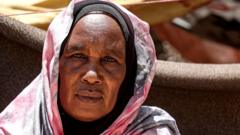This website uses cookies so that we can provide you with the best user experience possible. Cookie information is stored in your browser and performs functions such as recognising you when you return to our website and helping our team to understand which sections of the website you find most interesting and useful.


There is no electricity and the shortage of water is acute, made more so by lack of fuel and increased demand from the influx of displaced people.
“The price of water is catastrophically high,” says Hussein Osman Adam, who picks up work as a taxi driver and food dealer when he can.
“Life is tremendously tragic for everyone in an indescribable way, economically, health-wise and psychologically.”
Hussein has diabetes, but supplies to test blood sugar levels have run out.
“Currently, we're just expecting anything,” he says.
The UN and US are anticipating the worst.
They have issued warnings about the consequences of a full-scale attack on an area already on the brink of famine.
It would be a “large-scale massacre… a disaster on top of a disaster,” the US ambassador to the UN, Linda Thomas-Greenfield, said earlier this week.
That prediction builds on what has been reported from other cities conquered by the RSF and allied Arab militias: widespread looting, ethnic violence against non-Arab groups and sexual attacks.
RSF commanders deny these accusations. They say they have a legitimate right to self-defence against army aggression and accuse the military of deliberately killing civilians with barrel bombs.
One of the reasons they have not been able to take El Fasher yet is because armed groups there have allied with the Sudan Armed Forces (SAF), chiefly rebels from the Zaghawa ethnic group who have vowed to inflict a decisive defeat on the RSF.
So, if war explodes in the besieged city, it is expected to be fierce and deadly.
“At this point, civilians and the SAF do not have a clear escape route,” said Nathaniel Raymond, executive director of the Humanitarian Research Lab at Yale’s School of Public Health.
“We call this phenomenon… a kill box,” he told a recent emergency media briefing, “and the space for intervention is probably gone.”
His researchers were seeing evidence, he said, that the army was preparing to fight a close-quarter battle “to the death”.
International medical charity Médecins Sans Frontières (MSF), which is on the ground, told the BBC it had so far treated 125 patients wounded in the fighting by military airstrikes and RSF shelling.
But for months it has been warning of a malnutrition crisis in the Zamzam camp south of El Fasher, home to many uprooted by previous waves of ethnic violence, that requires a massive increase in the humanitarian response.
The increased tensions have made that more difficult than it already was, says Claire Nicolet, head of MSF’s emergency response in Sudan, and an escalation in fighting would make it far worse.



 Africana55 Radio
Africana55 Radio 
